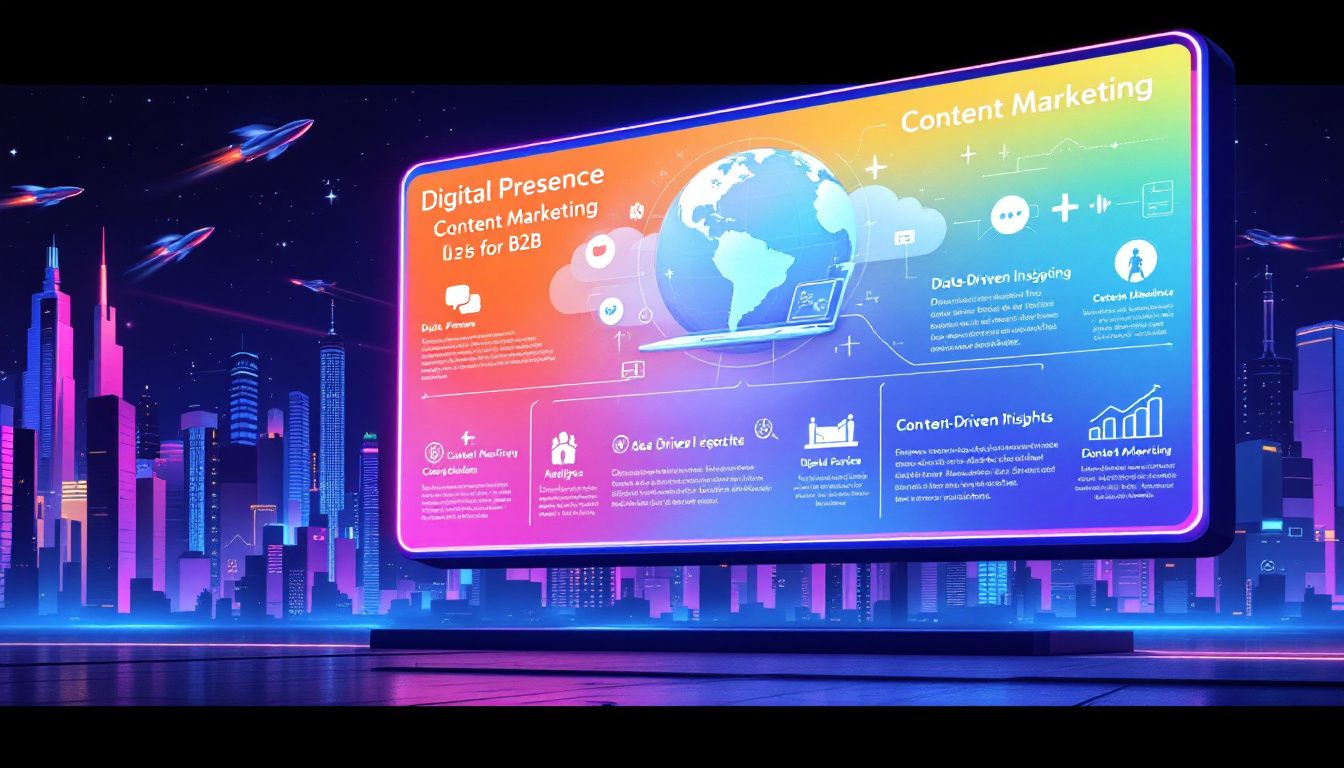Are you looking for innovative B2B business ideas to help you start your next venture? This article presents 12 profitable ideas to serve other businesses, covering sectors like digital marketing, cloud computing, and supply chain management. These opportunities are designed to meet the evolving needs of the modern business landscape. Read on to discover which B2B idea suits you best.
Key Takeaways
Table of Contents
- 1 Key Takeaways
- 2 Digital Marketing Services for B2B
- 3 Cloud Computing Solutions
- 4 Customer Relationship Management (CRM) Software
- 5 Supply Chain Management Services
- 6 Enterprise Software Solutions
- 7 Content Marketing Agencies
- 8 E-commerce Platforms for B2B
- 9 Consulting Services for Business Operations
- 10 Database Management Solutions
- 11 Email Marketing Services
- 12 User-Friendly Collaboration Platforms
- 13 Social Media Management for B2B
- 14 Top B2B Manufacturing Business Ideas for Entrepreneurs
- 15 Summary
- 16 Frequently Asked Questions
- Digital marketing, cloud computing, and CRM software are essential tools for B2B businesses to enhance productivity and customer engagement.
- The B2B e-commerce market is rapidly growing, necessitating secure platforms and integrated software solutions to meet diverse business needs.
- B2B manufacturing offers significant opportunities, especially in sectors like packaging, pharmaceuticals, and eco-friendly products, emphasizing the importance of innovation and market demand.
Digital Marketing Services for B2B

Digital marketing is a cornerstone for B2B companies, enabling them to promote products and services to other businesses through advanced online strategies. Leveraging digital marketing solutions significantly increases brand awareness and conversion rates, keeping businesses competitive in a crowded market. Tools like marketing automation improve efficiency and personalization, helping businesses deliver customer-focused services that resonate with their target audience.
A robust digital marketing strategy can encompass various tactics, including search engine optimization, content marketing, and social media marketing. These strategies enable B2B companies to enhance their online presence and attract potential customers, ultimately driving growth and ensuring long-term success.
Utilizing cutting-edge technology solutions and inbound marketing approaches, businesses can create compelling digital experiences that captivate and convert their audience.
Cloud Computing Solutions

Cloud computing is revolutionizing the way businesses operate, offering scalable and cost-effective solutions that enhance operational efficiency. The global market for cloud computing is projected to exceed $1 trillion by 2028, driven by the increasing adoption of cloud services by businesses worldwide. By 2023, many organizations are expected to run most of their workloads in the cloud, underscoring the technology’s critical role in modern business operations.
Businesses adopting cloud computing can benefit from reduced Total Cost of Ownership, improved disaster recovery capabilities, and enhanced security. Companies like Microsoft, with their Azure cloud services, offer enterprise-level security solutions that ensure the protection of sensitive data while providing the flexibility needed to adapt to changing market demands.
This makes cloud computing an indispensable tool for businesses looking to stay agile and competitive.
Customer Relationship Management (CRM) Software
Customer Relationship Management (CRM) software is essential for businesses aiming to centralize client information and streamline communication. Automating marketing, sales, and customer service processes with CRM systems increases efficiency, reduces errors, and helps businesses better understand and serve their clients. This centralization also enhances collaboration, providing visibility into the sales pipeline and enabling sales teams to track deals at every stage.
Advanced CRM systems offer features like lead scoring and custom dashboards, which help prioritize leads and tailor data presentations for specific performance metrics. AI capabilities in CRM systems can suggest next actions based on customer interactions and data, further enhancing the customer experience and driving strategic decision-making.
Utilizing these tools helps businesses build strong customer relationships and achieve long-term success.
Supply Chain Management Services

Supply chain management is a critical component of B2B transactions, ensuring the efficient procurement and distribution of raw materials and components necessary for manufacturing. Companies like FedEx and UPS play a pivotal role in streamlining the supply chain, offering reliable logistics and shipping services that help businesses meet their delivery needs effectively. DHL, with its flexible shipping solutions, can adapt to the needs of businesses of all sizes, making it a valuable partner in complex supply chains.
The rise of e-commerce has further enhanced shipping processes, enabling businesses to boost order throughput and manage shipments with ease. Reliable logistics networks and user-friendly platforms provided by companies like FedEx ensure that businesses can distribute their products efficiently, reaching customers across the globe.
This makes supply chain management services indispensable for businesses looking to enhance their operational efficiency and customer satisfaction.
Enterprise Software Solutions
Enterprise software solutions are vital for businesses seeking to secure their operations and streamline their processes. Custom software tailored to meet specific security requirements can provide a unique advantage by aligning with a company’s operational needs. Enterprise-level security solutions are essential for preventing data breaches and protecting sensitive information, making them a critical investment for any business.
SaaS (Software as a Service) models offer quick deployment and scalability, allowing businesses to adapt to changing demands without significant upfront costs. These solutions enable businesses to integrate various functions, from customer relationship management to supply chain management and sales process, into a comprehensive suite that enhances overall efficiency and productivity.
Adopting enterprise software solutions ensures businesses remain competitive and secure in an increasingly digital world.
Content Marketing Agencies
Content marketing is a powerful tool for B2B companies, helping them establish credibility and support their SEO efforts by providing valuable information to potential customers. The primary role of content marketing is to attract and engage potential customers, using strategies like inbound marketing to convert visitors into leads and, eventually, loyal clients. Using tools like HubSpot allows businesses to create, distribute, and analyze content across multiple channels, enhancing marketing effectiveness.
Effective B2B content marketing involves tailoring content with relevant keywords and meta descriptions to improve search engine visibility. Engaging content should include images, videos, and infographics to keep the audience interested and informed.
Social media marketing and influencer marketing are also vital components, as they help businesses reach targeted audiences and build stronger relationships with their clients. By employing these strategies, businesses can enhance their online presence and drive growth.
E-commerce Platforms for B2B
The B2B e-commerce market is experiencing unprecedented growth, projected to surpass $2 trillion in 2024 and reach $20.9 trillion by 2027. This shift towards online buying empowers businesses to be agile, competitive, and consumer-focused. Customization is increasingly important, allowing businesses to scale and adapt to market demands, while omnichannel capabilities ensure seamless sales across various platforms.
Security remains a top concern for customers when choosing an e-commerce platform, emphasizing the need for robust data protection and fraud prevention measures. Effective logistics and reliable delivery services are crucial for supporting efficient B2B transactions, ensuring timely shipments and enhancing customer satisfaction.
By integrating business software like ERP and CRM, e-commerce platforms can provide a comprehensive solution that meets the diverse needs of modern businesses.
Consulting Services for Business Operations
Consulting services play a vital role in helping businesses refine their strategies and achieve growth. By studying successful B2B marketing examples, startups and established companies alike can gain inspiration and implement proven strategies to enhance their operations. A well-structured security plan is essential for identifying vulnerabilities and managing risks effectively, ensuring business continuity and protecting sensitive data.
Comprehensive security measures, including employee training and access control systems, are crucial for maintaining a secure operational environment. By leveraging consulting services, businesses can develop tailored solutions that address their unique challenges and opportunities, ultimately driving success and long-term growth.
These services provide valuable insights and expertise that can help businesses navigate complex market conditions and stay ahead of the competition.
Database Management Solutions
Effective database management is crucial for maintaining the accuracy and consistency of organizational data. Integrity constraints, such as entity integrity and referential integrity, ensure that data remains valid and accurate during operations like deletion and updates. Physical and logical integrity safeguard data against threats like power outages and hacking, ensuring that data remains unchanged across various uses in relational databases.
Flexible and user-friendly platforms like Airtable offer robust database management solutions that cater to the unique needs of businesses. Adobe’s Document Cloud solutions also help manage documents digitally, enhancing security and streamlining workflows. By implementing advanced database management solutions, businesses can ensure data integrity, improve efficiency, and support informed decision-making.
Email Marketing Services
Email marketing remains one of the most effective channels for B2B companies, offering a high return on investment (ROI) and driving significant revenue. With an average ROI of $44 for every dollar spent, email marketing is a cost-effective strategy that can yield substantial results without extensive resource expenditure. Personalized emails, such as those including recipient names, can enhance clickthrough rates and engagement.
Automated email marketing allows businesses to engage with clients based on their sales funnel stage, saving time and improving efficiency. Email newsletters help establish businesses as thought leaders, enhancing credibility and authority in their industry.
Embedding links within email content drives website traffic and generates leads, making email marketing indispensable for B2B companies.
User-Friendly Collaboration Platforms
User-friendly collaboration platforms like Slack and Asana significantly enhance communication and productivity within enterprises. These platforms provide centralized communication, file sharing, and integration with business tools, enabling seamless teamwork and streamlining workflows. Slack, for instance, serves as a user-friendly collaboration platform that facilitates real-time collaboration and operational efficiency.
Asana, known for its collaborative work management features, helps teams better organize projects and manage tasks. Its customizable interfaces and integration with third-party applications make it a valuable tool for enhancing team collaboration. Recent trends indicate that Asana’s annual revenue consistently increases, reflecting its growing acceptance and value in the market.
By leveraging these platforms, businesses can improve team communication, efficiency, and overall productivity.
Social Media Management for B2B

Social media management is a crucial component of B2B marketing strategies, with 87% of B2B companies considering it essential. High-level decision-makers are significantly influenced by social media content, making it a powerful tool for driving purchasing choices. LinkedIn is the primary platform used by B2B businesses, offering a space for digital marketing and professional networking.
Engaging with clients on social media can improve brand perception and foster trust, enhancing a company’s reputation as a thought leader in its industry. Social media platforms also facilitate direct communication with clients, providing support and building stronger customer relationships. Effectively managing social media presence drives engagement, builds trust, and helps achieve marketing goals.
Top B2B Manufacturing Business Ideas for Entrepreneurs

The B2B manufacturing sector offers immense opportunities for entrepreneurs seeking profitable ventures. Manufacturing businesses cater directly to other businesses, such as wholesalers, retailers, or industrial units, making them a vital part of the global supply chain. From packaging materials to pharmaceuticals, these business ideas allow entrepreneurs to innovate and address global demands through tailored products.
This section will introduce various B2B manufacturing ideas, each with unique potential and advantages. Understanding these ideas enables entrepreneurs to make informed decisions about opportunities that align with their skills and market needs.
Packaging Material Manufacturing
Packaging materials are crucial for transporting and preserving products in industries like FMCG, e-commerce, and food. This highly scalable business idea includes products like corrugated boxes, bubble wraps, and biodegradable packaging materials. Sustainable packaging solutions, such as jute and paper-based products, are gaining traction due to environmental concerns.
Entrepreneurs can tap into the growing demand for eco-friendly packaging by creating innovative, sustainable products that meet industry needs. Focusing on quality and scalability makes packaging material manufacturing a highly profitable venture.
Food Processing and Packaging
The food industry is experiencing rapid growth, driving consistent demand for food processing and packaging units. Entrepreneurs can explore various options such as ready-to-eat meals, packaged snacks like chips or cookies, and bottled beverages or sauces. The trend towards convenience is a significant factor, making processed and packaged food items highly sought after.
Investing in food processing and packaging allows businesses to cater to local and global markets, ensuring steady revenue. This sector offers a profitable venture for manufacturers willing to meet the evolving preferences of consumers and businesses alike.
Garment and Textile Manufacturing
Garment and textile manufacturing provides a wide range of opportunities in both the fashion and utility segments. Entrepreneurs can focus on producing corporate uniforms, specialized fabrics such as fireproof or water-resistant materials, and trendy fashion apparel. Customization in clothing, such as bespoke uniforms or specialized workwear, is increasingly appealing to business clients.
The demand for high-quality, customized garments is rising, making this an attractive sector for manufacturers. Delivering unique and specialized products helps businesses establish a strong market presence and achieve long-term success.
Chemical Manufacturing
Chemical manufacturing serves various industries, including agriculture, construction, and healthcare. Entrepreneurs can consider producing industrial chemicals like adhesives and paints, cleaning agents, and fertilizers and pesticides. Innovations in chemical formulations, particularly eco-friendly alternatives, are becoming essential as industries seek sustainable options.
Focusing on sustainable chemical manufacturing meets the growing demand for environmentally friendly products. This sector offers significant growth potential for those willing to innovate and adapt to market needs.
Electronics and Component Manufacturing
The increasing reliance on electronics creates substantial demand for components and devices.
Manufacturing ideas include:
- Consumer electronics like mobile accessories and smart devices
- Industrial electronics such as sensors and transformers
- Renewable energy components like solar panels
The rise in electric vehicles and smart technologies further boosts the demand for specialized electronic components.
Entrepreneurs entering the electronics manufacturing sector can capitalize on these trends by producing innovative and high-quality products. This industry promises robust growth opportunities for businesses that can meet the evolving technological needs.
Plastic Products Manufacturing
Plastic products are extensively used across various industries, despite a shift towards sustainability. Manufacturers can focus on producing industrial components, consumer goods like storage containers, and construction materials such as PVC pipes. There is a growing emphasis on recycling and using recycled materials in the production of plastic goods.
Adopting sustainable practices and innovative solutions addresses environmental concerns while meeting market demand. The continuous need for plastic products ensures a steady revenue stream, making this a viable manufacturing business idea.
Furniture Manufacturing
Furniture manufacturing is a lucrative sector with consistent demand for various types of furniture. Entrepreneurs can produce modular office furniture, residential furniture, and custom-built designs for hotels or offices. The demand for ergonomic furniture solutions is increasing as businesses prioritize employee comfort and productivity.
Focusing on quality and innovative designs allows furniture manufacturers to cater to diverse market needs and ensure long-term success. This sector offers ample opportunities for growth and profitability.
Pharmaceutical Manufacturing
The pharmaceutical industry is evergreen, providing numerous opportunities for manufacturing businesses. Entrepreneurs can consider producing generic medicines, nutraceuticals and dietary supplements, and medical devices. The development of personalized medicine is reshaping pharmaceutical production strategies and market opportunities.
Focusing on innovation and quality allows pharmaceutical manufacturers to meet the growing demand for healthcare products. This sector promises steady growth and profitability for businesses willing to invest in cutting-edge solutions.
Eco-Friendly Product Manufacturing
With increasing environmental awareness, eco-friendly manufacturing businesses are on the rise. Entrepreneurs can explore producing biodegradable utensils, bamboo products, and recyclable packaging materials. The market for biodegradable and sustainable products is expanding as consumer awareness around environmental issues increases.
Focusing on sustainability and innovation allows businesses to tap into the growing demand for eco-friendly products. This sector offers significant growth potential for manufacturers committed to protecting the environment.
Metal Fabrication
Metal fabrication businesses cater to industries like construction, automotive, and manufacturing. Entrepreneurs can produce prefabricated building materials, tools and machinery, and precision components for industrial use. The demand for custom metal fabrication is rising, particularly in construction and renewable energy sectors.
Delivering high-quality and customized metal products meets the specific needs of various industries, ensuring long-term success. This sector offers ample opportunities for growth and profitability.
How to Start a B2B Manufacturing Business
Starting a B2B manufacturing business requires careful planning and execution. The first step is conducting thorough market research to identify a niche market with steady demand and minimal competition. Next, entrepreneurs should prepare a detailed business plan covering investment, operations, and sales strategy. Obtaining necessary licenses and ensuring regulatory compliance are crucial steps in setting up the business.
Investing in machinery, raw materials, and skilled labor is essential for setting up the infrastructure. Building a strong sales network by partnering with wholesalers, retailers, or industrial buyers is also important for success.
Leveraging online platforms to showcase products and connect with potential clients can enhance visibility and drive growth. Following these steps helps entrepreneurs establish a thriving B2B manufacturing business.
Benefits of B2B Manufacturing Businesses
Before:
B2B manufacturing businesses offer several advantages, including higher order volumes and long-term contracts. Business to business clients often purchase in bulk, leading to consistent revenue and stable cash flow. Long-term relationships with businesses can secure repeat orders, reducing the need for extensive marketing efforts.
After:
B2B manufacturing businesses offer several advantages:
- Higher order volumes
- Long-term contracts
- Consistent revenue from bulk purchases
- Stable cash flow
- Repeat orders from long-term relationships, reducing the need for extensive marketing efforts
Manufacturing businesses can also scale their operations by expanding product lines or increasing production capacity to meet growing demand. Leveraging bulk purchasing agreements reduces costs and enhances profit margins for manufacturers. These benefits make B2B manufacturing an attractive and profitable venture for entrepreneurs.
Conclusion
B2B manufacturing businesses present excellent opportunities for entrepreneurs to create value and earn profits. From packaging materials to pharmaceuticals, the key to success lies in choosing the right niche, maintaining quality, and building strong relationships with clients through effective business solutions.
With strategic planning and innovation, you can establish a thriving manufacturing business that supports industries globally. The B2B sector offers immense potential for those willing to invest in cutting-edge solutions and adapt to market demands.
Summary
In summary, the B2B sector is brimming with innovative business ideas that can drive growth and profitability. From digital marketing and cloud computing to manufacturing and consulting, these ideas offer practical solutions for businesses looking to stay competitive and meet the evolving needs of their clients. By leveraging cutting-edge technology and focusing on customer satisfaction, businesses can create value and achieve remarkable success.
As you explore these B2B business ideas, remember that the key to success lies in innovation, quality, and building strong relationships with clients. Whether you’re an established enterprise or a budding entrepreneur, these ideas provide valuable insights and practical strategies to help you thrive in the dynamic B2B landscape. Embrace the opportunities, adapt to market demands, and let these innovative ideas guide you towards a prosperous future.
Frequently Asked Questions
What are the key benefits of B2B manufacturing businesses?
B2B manufacturing businesses provide significant advantages such as higher order volumes and long-term contracts, which enhance profitability and scalability while lowering marketing expenses. These factors contribute to their overall financial success and sustainability.
How can digital marketing benefit B2B companies?
Digital marketing significantly boosts brand awareness and conversion rates for B2B companies by leveraging strategies such as SEO and social media marketing to enhance their online presence. Implementing these strategies is essential for staying competitive in the digital landscape.
Why is cloud computing important for businesses?
Cloud computing is crucial for businesses as it provides cost efficiency, enhanced security, scalability, and robust disaster recovery options. Embracing these benefits can significantly improve operational efficiency and competitiveness in the market.
What role does CRM software play in B2B?
CRM software plays a crucial role in B2B by centralizing client information and automating processes, which enhances collaboration and decision-making. This ultimately improves customer relationships and operational efficiency.
How can entrepreneurs start a B2B manufacturing business?
To successfully start a B2B manufacturing business, conduct thorough market research and prepare a solid business plan, then secure the necessary licenses and infrastructure. Building a sales network and establishing a digital presence are also essential for growth.